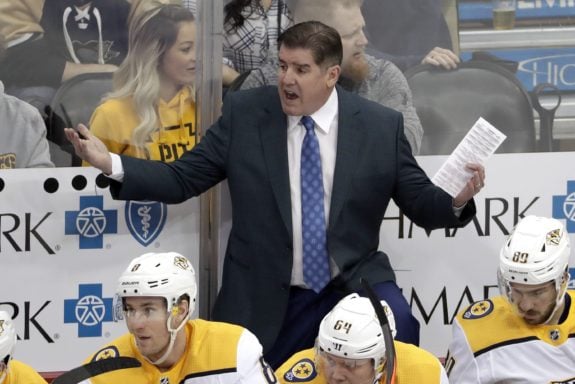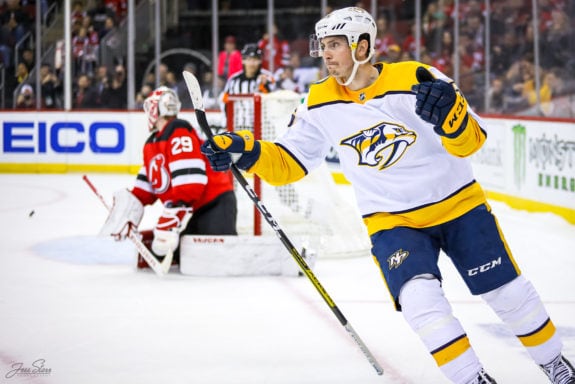Matt Duchene’s first season with the Nashville Predators was not what general manager David Poile had hoped for when he signed the 28-year-old forward away from the Columbus Blue Jackets last summer. Duchene was without question the second-best unrestricted free agent on the market, after Artemi Panarin, and he was rewarded with a seven-year, $56 million contract. The Predators, with little depth behind Ryan Johansen, were in desperate need of a proven center. Kyle Turris could not be relied upon to produce at a top-six forward rate on a Stanley Cup-caliber team and Nick Bonino slotted in well as the third-line center.
Related: Revisiting the Capitals’ Disastrous Jagr Trade
The Predators needed production and, more importantly, a top-line center that could put the puck in the back of the net, and Duchene was a proven 25 to 30-goal scorer. He was brought in to be that creative, puck-moving center that could also score while providing stability and improve their NHL-worst power play in 2018-19. However, he failed to capitalize on multiple fronts this season, finishing the campaign ranked 124th in league scoring with 42 points.
Duchene’s Production
The season started off well for Duchene as he accumulated 31 points over his first 44 games before the All-Star break. However, he only scored 11 points in the 22 games thereafter, finishing the coronavirus-shortened season with 42 points in 66 games. To top it off, he rewarded his new organization and city with a new personal record: the fewest number of goals of any season in his NHL career.

Hockey players need to shoot to score, and it was obvious watching Duchene this season that he was not shooting the puck enough. He only attempted 136 shots through 66 games, which is just over two shots per game (2.06). Over 1,146 games between 2013 and 2019, he averaged 2.49 shots per game, or 17 percent more than in 2019-20. Unconscionably, this translated into 56 percent fewer goals per 60 minutes this season than on average over his past three seasons (0.55 vs 1.25). However, this drop was not for a lack of chances. He had his highest even-strength scoring chances for of his career (SCF, 54.1%) and among his highest career marks in 5-on-5 High Danger Chances For as well (HDCF, 181).
Related: Revisiting David Poile’s Drafts – 2009
His most common linemates this year were Mikael Granlund and Filip Forsberg, and they were a highly aggressive bunch. Of all the lines that scored at least 10 even-strength goals this season, they led the league in offensive zone start percentage, which measures the amount a player or line starts a shift in the offensive zone. To understand why there was a drop in Duchene’s production, it is necessary to contextualize his output in the Nashville system as defined by the two contrasting head coaches for which he played this season, Peter Laviolette (through Jan. 6, 2020) and John Hynes.
Laviolette vs Hynes
Duchene’s first season with the Predators involved a coaching change in early January. Laviolette had been the Predators head coach for five-plus years and the hope was for his offensive system to work in Nashville. His system is highly structured and emphasizes puck control in the offensive zone, moving players with the puck into open areas.

During the last four years of Laviolette’s tenure in Nashville, the Predators ranked seventh in Corsi For percentage, which implies that they controlled possession and scoring chances. But the Predators were 21st in the NHL during that time period in HDCF and 19th in SCF. Ironically, it was in this system that Duchene was most successful, registering 31 points in 44 games.
Hynes, on the other hand, implemented a much more aggressive, risk-taking style of play as the New Jersey Devils head coach and has done so in his short tenure in Nashville as well. Judging from the numbers, Duchene had difficulty in this style, and his time on ice fell from over 17 minutes with Laviolette to closer to 15 under Hynes. It was thought that Hynes’ system would create more scoring for the Predators’ top lines, just as it did for the Devils during his tenure there.
The Devils vastly improved in their HDCF/60 over his four years as head coach, moving from 30th in the league to 11th. The same goes for the Devils expected goals for per 60 minutes going from 30th to sixth in the league. The sample size may be too small to adequately judge Duchene’s performance in the Hynes’ system, as next season will be much more telling as to what to expect from him moving forward.
Looking to Next Season
To recap, Duchene was involved in more quality scoring opportunities than in any season before, and his line lived in the offensive zone more than any other in the league this season while Laviolette was the coach. Yet despite all this time near the opponents’ net, his line only scored 14 goals together and Duchene himself scored a career-low 13 goals. The change to a more open style of offense may not actually improve his production as he was already fairly productive under the more structured Laviolette system, but time will tell.

Duchene is much too talented of a center to continue to produce at a suboptimal level given his age, history of production, and talent that will be playing with him. The hope is that Hynes’ system will lead to more creative movement through filling gaps, defensive pinching, and high danger opportunities that will help Duchene. It will be interesting to see what Poile does with Granlund, a pending free agent this offseason, and if he opts to go in another direction (Taylor Hall, Mike Hoffman, Evgenii Dadonov, and Tyler Toffoli highlight the 2020 free-agent forward class).
Both Duchene and Granlund underperformed this season and Poile might decide to bring in a different first-line forward to pair with Duchene and Forsberg. If Nashville wants to return to the top of the Western Conference, it will need Duchene to produce at a higher level than he did this season, or the Predators will be stuck with a huge contractual liability on the ice for six more years.